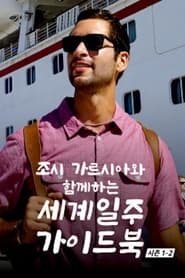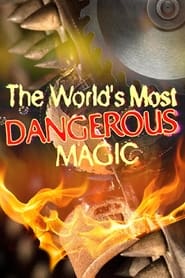Nbc TV Series - Page 75
-
Wild Child
2021
star 10In their first years on Earth, the cutest, most curious and fascinating wild baby animals on the planet overcome an array of environmental challenges and threats from predators of all kinds. Exploring a diverse world of wild animals in their natural habitats, host Sheinelle Jones reveals the incredible bond that exists within the animal kingdom between parents and their children, and provides an inside look at how these untamed youngsters are born, how they play and how they learn to survive in the wild. -
Treasure Hunt
1956
Treasure Hunt
1956
Treasure Hunt is an American television game show that ran in the 1950s, 1970s, and 1980s. The show featured contestants selecting a treasure chest or box with surprises inside, in the hope of winning large prizes or a cash jackpot. -
Scattergories
1993
Scattergories
1993
Scattergories is an American game show on NBC daytime hosted by Dick Clark, with Charlie Tuna as announcer, that aired from January 18 to June 11, 1993. The show was produced by Reg Grundy Productions, now a part of FremantleMedia, and was the second to last American game show to be produced by the company. -
Winters
0000
Winters
0000
Winters is a light police drama pilot for NBC revolving around female detective Christie Winters, played by Famke Janssen, and her colleagues in Los Angeles. The pilot was created and written by House alums David Shore and Peter Blake. -
Battlestars
1981
Battlestars
1981
Battlestars is an American game show that aired for two separate runs on NBC during the early 1980s. The show's first run aired from October 26, 1981 to April 23, 1982. An updated version–titled The New Battlestars–ran for 13 weeks, from April 4 to July 1, 1983. Battlestars was produced by Merrill Heatter Productions, Heatter's first show produced without Bob Quigley. The host was Alex Trebek and the announcers were Rod Roddy and Charlie Tuna. -
Yes, Chef!
2025
Yes, Chef!
2025
Twelve nominated chefs face off in culinary challenges while working through personal obstacles. Martha Stewart and José Andrés guide them as they compete for glory in the kitchen and growth in their lives. -
TrialWatch
1991
TrialWatch
1991
-
The Dinah Shore Show
1951
The Dinah Shore Show
1951
The Dinah Shore Show is an American variety show which was broadcast by NBC from November 1951 to January 1956, sponsored by General Motors' Chevrolet division. For most of the program's run, it aired from 7:30 to 7:45 Eastern Time on Tuesday and Thursday nights, rounding out the time slot which featured the network's regular evening newscast, which, like all such programs of the era, was then only 15 minutes in length. -
Go
1973
Go
1973
Go is an American television series for children that aired late-mornings on Saturdays on NBC between September 1973 and September 1976. It had the shortest title for a TV series until V debuted in 1984 on the same network. The first two seasons of Go explored various occupations. For the third season, the emphasis shifted to America's Bicentennial observance of 1976, therefore Go became Go-U.S.A. from September 6, 1975 until the series ended the following year. -
The Hartmans
1949
The Hartmans
1949
The Hartmans is an American television sitcom that aired live on NBC on Sunday nights from February 27 to April 24, 1949. The series stars Paul and Grace Hartman, a married couple who performed together on the vaudeville circuit and on the Broadway stage. -
The Who, What, or Where Game
1969
star 6The Who, What, or Where Game was an American television game show that was broadcast weekdays on NBC from December 29, 1969 to January 4, 1974. The host was Art James, and the announcer was Mike Darrow; Ron Greenberg packaged the show, which was recorded in NBC studios 6A and 8H in Rockefeller Plaza in New York City. -
Who Killed Lake Erie
1969
Who Killed Lake Erie
1969
Who Killed Lake Erie is a two and a half hour television documentary that aired on NBC in September 1969. -
Say When!!
1961
Say When!!
1961
Say When!! is an American game show emceed by Art James which aired on NBC television from January 2, 1961 to March 26, 1965. The show was a Mark Goodson-Bill Todman production and James' only game show for them. Wayne Howell was the announcer, and Ruth Halsey was a model. Carmen Mastren was the show's musical director, with the main theme and prize cues played live on two electric guitars. The series aired live in black and white from NBC Studio 6A at 30 Rockefeller Plaza, New York. -
The Runaway Barge
1975
The Runaway Barge
1975
The Runaway Barge is the pilot for an unsold TV series. Bo Hopkins, Tim Matheson and Jim Davis star as three owners of a Mississippi river tugboat who find themselves neck deep in a kidnapping and hijacking plot. -
Leave It to the Girls
1949
star 3Leave It to the Girls is an American radio and television talk show, created by Martha Rountree, and broadcast, in various forms, from the 1940s through the 1980s. -
Double Up
1992
Double Up
1992
Double Up is an American game show that aired very briefly on NBC Saturday mornings from September 5 to October 17, 1992. J. D. Roth hosted as well as being one of its executive producers. A rap DJ named Disco served as announcer. -
The World's Most Dangerous Magic
1998
The World's Most Dangerous Magic was the title of two American television specials showcasing illusion and escapology acts, which were made for the NBC network. The first was originally broadcast on 27 April 1998 and the second, titled The World's Most Dangerous Magic 2, was initially aired on 2 May 1999. The shows were the brainchild of producer Gary Ouellet and were made by the Gary L Pudney Company. They featured a combination of famous performers and lesser-known magicians, each performing stunts or illusions that were claimed to involve the risk of death or serious injury. While some stunts clearly involved genuine life-threatening danger should anything have gone wrong, the risk of injury in others was open to question. In the first show, The Pendragons performed the illusion Impaled, which was described as a "balancing feat" in which Charlotte Pendragon risked fatal impalement should it go wrong. However this is a well known illusion in the general repertoire of stage magic in which the performer is not act -
Winning Streak
1974
Winning Streak
1974
Winning Streak is an American television game show hosted by Bill Cullen and announced by Don Pardo. It aired daily on NBC from July 1, 1974 to January 3, 1975 and was produced at the NBC Studios in New York's Rockefeller Plaza. -
Saturday Roundup
1951
star 5Saturday Roundup is an American Western television program that aired on NBC on Saturday night from June 10, 1951 to September 1, 1951 at 8:00 p.m Eastern time .


